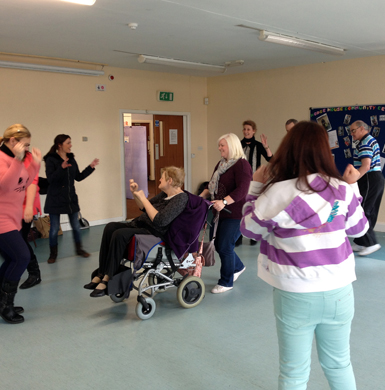Driving up Quality Code
The Driving Up Quality Code is a voluntary code of conduct written as a response to the abuse at Winterbourne View.
The code was created by the Driving Up Quality Alliance, made up of national member organisations that collectively represent 80% of all learning disability service providers in the country. It was launched in September 2013 at the House of Commons.
The code is endorsed by the Minister of State for Care and Support, Norman Lamb (who contributed a foreword), the Department of Health and the Care Quality Commission. Its primary aims include improving quality in learning disabilities services and promoting a culture of honesty and transparency.
Organisations that sign up to the Driving Up Quality Code are expected to assess themselves annually and publish what they find, with an action plan for improvement.
See our sign up pageDriving Up Quality Report

Pendle Support signed up to the initiative on 3rd March 2015 and completed the self assessment tool in April 2015.
We value people and their families and are committed to the Lancashire values of…
1. CHOICE
We might look at:
- Who/how are staff selected that support you?
- Do you like who supports you?
- What makes someone supporting you good?
- Can you choose who supports you?
- Do you know who is supporting you and when?
- How do staff find out what you want?
- Where you live / who you live with
- Do you like the people you live with?
- Do you like where you live?
- Can you choose how you decorate your home?
- How did you decide how to live here?
- Do you have photos of what you like doing?
- Who chooses what you do?
2. FEELING SAFE
We might look at:
- Physical security of home (ID checked at front door)
- If people look relaxed/fearful withdrawn etc.
- Risk assessments – review accident book
- Recruitment checks
- Are you happy/do you feel safe? What would you do if you weren’t?
- Who would you go to?
- Do family/friends visit you?
- Where do they live/nearby?
- How do people/staff interact?
- Do you go out much? Who with? Where to?
- General atmosphere / how do you feel?
- Do individuals answer questions easily without referring to staff?
- If you want to complain, how do you go about it? Who to?
- Visiting at different times of the day (evening and weekend)
- How do you get help if you need it?

3. BEING LOVED
We might look at:
- What contact do you have with family and friends and how often? Is that enough?
- Are you able to have a boyfriend or girlfriend?
- Who’s important to you?
- Do you need help to contact your family and friends? Do you get it?
- Would you like photos of family and friends to be on show if you have any?
- Do you get a chance to meet new people?
- How are people spoken to?
- Are there cooking or baking smells? Or bad smells?
4. BEING HEALTHY
We might look at:
- How do you stay healthy?
- Do you have an informed choice in what you eat?
- Do you feel anxious or unhappy?
- Do you feel lonely?
- Do you have a doctor / dentist?
- How often do you see them?
- Do you have a Health Action Plan/Health Passport?
- Do you have a menu plan?
- Do you do your own shopping or have a choice in your shopping?
- What activities have you done over the last week?
- Do you feel too hot or cold?
5. HAVING FRIENDS
We might look at:
- What contact do you have with family and friends?
- Who is important to you?
- Who are your friends?
- Do you need support to meet your friends?
- Are there photos of you doing activities or hobby equipment?
- How easy do you find making new friends?
- Where do you make new friends?
- How often do you see your friends?
- How do you keep in touch with your friends?
- How long have you known each other?

